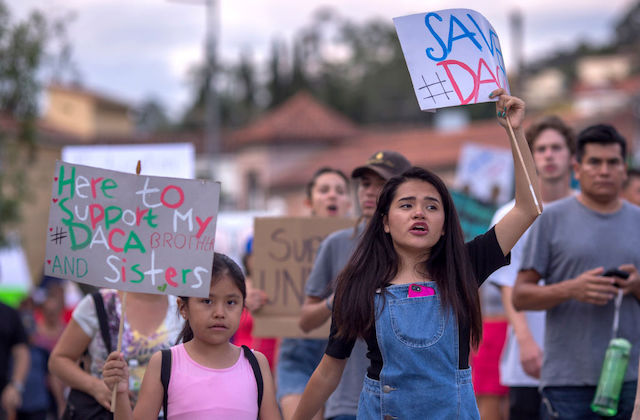On September 5, 2017, Attorney General Jeff Sessions announced that the Trump administration was terminating the Deferred Action for Childhood Arrivals (DACA) program. But an order issued by U.S. District Judge William Alsup yesterday (January 9), temporarily negates that decision.
Alsup ruled that the program, which currently protects 689,800 immigrants who were brought to the United States as children from deportation, must stay in effect while a legal challenge to the termination winds its way through the court system.
After Session’s announcement, the Department of Homeland Security (DHS) ordered that no applications for DACA submitted after September 5 would be accepted, and that current DACA recipients whose permits were set to expire between that date and March 5 would only be allowed to submit renewal requests through October 5. But per Alsup’s ruling, all immigrants who had DACA status on September 5 can still renew their applications. He did not order the government to accept new applications.
From Alsup’s 49-page order:
For the reasons DACA was instituted, and for the reasons tweeted by President Trump, this order finds that the public interest will be served by DACA’s continuation (on the conditions and exceptions set out below). Beginning March 5, absent an injunction, one thousand individuals per day, on average, will lose their DACA protection. The rescission will result in hundreds of thousands of individuals losing their work authorizations and deferred action status. This would tear authorized workers from our nation’s economy and would prejudice their being able to support themselves and their families, not to mention paying taxes to support our nation. Too, authorized workers will lose the benefit of their employer-provided healthcare plans and thus place a greater burden on emergency healthcare services.
On provisional relief motions, district judges must also weigh the balance of hardships flowing from a grant versus denial of provisional relief. The hardship to plaintiffs need not be repeated. The only hardship raised by defendants is interference with the agency’s judgment on how best to allocate its resources in keeping our homeland secure, as well as its judgment in phasing out DACA. Significantly, however, the agency’s judgment here was not based on a policy change. It was based on a mistake of law. If the instant order is correct that DACA fell within the statutory and constitutional powers of the executive branch, then a policy supported as high up as our chief executive has been the victim of a colossal blunder. A preliminary injunction will set that right without imposing any policy unwanted by the executive branch.
The ruling comes after several DACA-related lawsuits were filed against DHS and its leader, Secretary Kirstjen Nielsen, including five in United States District Court for the Northern District of California. Plaintiffs include the regents of the University of California and university president Janet Napolitano (who formerly served as secretary of Homeland Security under President Barack Obama); the states of California, Maine, Maryland and Minnesota, which filed their own suits on behalf of the DACA recipients within their borders; the city of San Jose, California, the county Santa Clara, California, and the Service Employees International Union Local 521; and several individual plaintiffs.
The suits collectively argue that the termination of DACA violates the Administrative Procedure Act, deprives DACA recipients of “constitutionally-protected property and liberty interests without due process of law” and violates equal protection of the law because it is “motivated by discriminatory animus.” They are seeking a ruling that the termination is illegal.
Per The Washington Post, Department of Justice spokesperson Devin O’Malley called the ruling “an unlawful circumvention of Congress.” He continued to say that, “The Justice Department will continue to vigorously defend this position, and looks forward to vindicating its position in further litigation.”
Members of Congress are currently battling over a legislative remedy to the termination that would provide a path to citizenship for DACA recipients.
